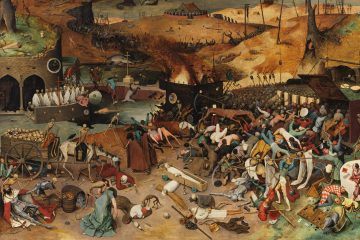Eliott Grover in Inside Hook:
 The panic began the moment the earliest cases were confirmed. Those with means hurriedly packed their belongings and fled the city. Those who stayed had a range of reactions: many laid siege to the markets, stocking up on provisions before barricading themselves and their families in their homes; some congregated in churches while others consulted astronomers and fortune-tellers; many more, dismissive of the invisible disease or the visible fear it stoked in the masses, continued their lives unabated. These individuals were the first to die. The government acted swiftly. Invoking emergency measures passed in earlier times, the mayor issued a series of orders that aggressively changed life in the city. Public events and gatherings were banned, schools were closed and the city was divided into more readily policeable quarters. Infected individuals were locked in their houses with their families and were forbidden from leaving under the penalty of death. Upstanding citizens, deputized in various capacities as searchers, examiner, and watchmen, were — under the penalty of death — tasked with overseeing this quarantine. The city in question is not Wuhan or Milan or Manhattan. It is London and the year is 1665. Before the end of 1666, the Bubonic Plague will kill roughly one-quarter of the city’s population. As devastating as this figure is, it could have been much worse.
The panic began the moment the earliest cases were confirmed. Those with means hurriedly packed their belongings and fled the city. Those who stayed had a range of reactions: many laid siege to the markets, stocking up on provisions before barricading themselves and their families in their homes; some congregated in churches while others consulted astronomers and fortune-tellers; many more, dismissive of the invisible disease or the visible fear it stoked in the masses, continued their lives unabated. These individuals were the first to die. The government acted swiftly. Invoking emergency measures passed in earlier times, the mayor issued a series of orders that aggressively changed life in the city. Public events and gatherings were banned, schools were closed and the city was divided into more readily policeable quarters. Infected individuals were locked in their houses with their families and were forbidden from leaving under the penalty of death. Upstanding citizens, deputized in various capacities as searchers, examiner, and watchmen, were — under the penalty of death — tasked with overseeing this quarantine. The city in question is not Wuhan or Milan or Manhattan. It is London and the year is 1665. Before the end of 1666, the Bubonic Plague will kill roughly one-quarter of the city’s population. As devastating as this figure is, it could have been much worse.
This is one of the key takeaways from Daniel Defoe’s A Journal of the Plague Year. Published in 1722, Defoe’s text is technically a novel, but historians and epidemiologists have praised it as an accurate report of life in London during “the Great Plague.” Defoe, who is most famous for his novel Robinson Crusoe, did live in London in 1665, but he was only five years old. In A Journal, a middle-aged narrator renders a graphic and comprehensive look at life inside a city beset with a pandemic far more terrifying than the one we face today. Defoe’s purpose for writing the novel was didactic. “I have set this particular down so fully,” the narrator states, “because I know not but it may be of moment to those who come after me, if they come to be brought to the same distress.”
More here. (Note: I re-read this recently and recommend highly. Shocking to see how little has changed since 1665)
